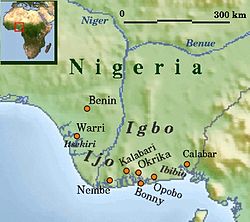Elem Kalabari
| Elem Kalabari (means Old Shipping) | |
|---|---|
| Traditional state | |
 Ijaw States, including Kalabari |
|
| Coordinates: 4°34′6″N 6°58′34″E / 4.56833°N 6.97611°ECoordinates: 4°34′6″N 6°58′34″E / 4.56833°N 6.97611°E | |
| Country | Nigeria |
| State | Rivers State |
| Government | |
| • Amanyanabo | Amachree XI (Theophilus J.T. Princewill) |
| Time zone | WAT (UTC+1) |
The Kalabari Kingdom, also called Elem Kalabari (New Shipping Port), or New Calabar by the Europeans, is the independent traditional Kingdom State of the Kalabari people, an Ijaw ethnic group, in the Niger River Delta. It is recognized as a traditional state in what is now Rivers State, Nigeria.
The Kingdom was founded by the great Amachree I, forefather of the Amachree dynasty, which is now headed by the Princewill family.
The Kingdom is ruled and controlled by King Amachree XI (Professor Theophilus Princewill CFR), along with his Council of Chiefs, most of whom, are royal princes. Together, they make up the traditional Kalabari government, similar to a royal court.
According to one tradition, the Kalabari people originally came from Calabar (called "Old Calabar" by the Europeans), a site further to the east occupied by Efik people. This may have been a 19th-century invention. The Efik themselves say the name "Calabar" was given to their town by the Europeans. Other traditions say Kalabari was founded by Ijo settlers from Amafo, on the west bank of the New Calabar River, and that they were joined there by settlers from other communities.
The people occupied a series of islands among the mangrove swamps of the delta, where they engaged in fishing and trading. They would take the produce of the delta region up the New Calabar and Imo rivers, and exchange them for food and goods of the hinterland. In the 15th century, the early European traders noted that they alone of the delta people refused to trade on credit.
The people of Elem Kalabari originally worshipped the goddess Owemenakaso (or Awamenakaso, Akaso), the mother of all the deities of the Kalabari clan, even when individual settlements had their own local gods and goddesses. She opposed war and bloodshed, and the Kalabari later claimed she was the sister of the British goddess Brittana, who ruled the seas. Among their neighbors, because of their civilized and generally peaceful behavior the Kalabari were called "Englishmen".
A ruler named King Owerri Daba was said to have brought the slave trade to Kalabari and Bonny, and to have founded the houses of Duke Monmouth and Duke Africa. This happened some time before 1699, since James Barbot records giving presents to Duke Monmouth of Kalabari in that year. Kalabari became an entrepôt of the Atlantic slave trade, mainly selling slaves purchased from Igboland, further to the north.
...
Wikipedia
